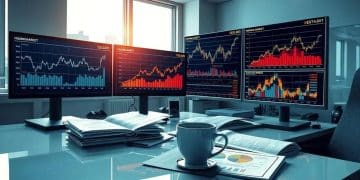Global economic outlook: insights for your future

Anúncios
Preparing for potential economic shifts requires awareness of warning signs, building financial resilience, and adapting strategies to respond effectively to changing market conditions.
The global economic outlook has shifted dramatically in recent years. With ongoing challenges and emerging opportunities, understanding these dynamics is crucial for making informed decisions. Let’s dive into the factors shaping our economic future.
Anúncios
Understanding the current global economic landscape
Understanding the current global economic landscape is essential for both individuals and businesses. This landscape is shaped by various factors that can lead to opportunities or challenges in different regions.
Major Influences on the Economy
Several key elements play a significant role in influencing the economy worldwide. These include:
Anúncios
- Government policies that regulate trade and investment.
- Technological advances that drive innovation.
- Global health issues that affect workforces.
- Climate change impacting resources and supply chains.
The global economic outlook and its factors are interconnected. For example, advances in technology can foster new industries, while regulations may either promote or hinder growth.
Regional Economic Trends
Different areas of the world experience unique economic trends. For instance, emerging markets often show rapid growth, while developed economies might focus on sustainability and innovation. Understanding these trends can help stakeholders make informed decisions.
In addition, geopolitical events can create instability. These fluctuations can influence consumer confidence and investment, making it crucial to stay updated on current events.
Another important aspect is the global supply chain. Disruptions here can affect everything from manufacturing to retail, highlighting the importance of diversification and resilience.
Adapting to Change
To navigate the complexities of the current landscape, businesses and individuals need to be adaptable. This might include investing in new technologies, being open to shifting markets, or developing strategies that consider potential economic shifts.
Moreover, education plays a pivotal role. By staying informed about economic trends and understanding the landscape, we can better prepare for the future.
Key factors influencing the economic outlook
The economic outlook is influenced by various factors that shape the future of the global market. Understanding these factors can help individuals and businesses prepare for changes ahead.
Economic Indicators
Key economic indicators give insights into the health of economies around the world. These include:
- GDP growth: Measures how fast an economy is growing.
- Unemployment rates: Indicates how many people are willing and able to work.
- Inflation: Reflects the increase in prices over time.
- Consumer confidence: Shows how optimistic consumers are about the economy.
Each indicator provides valuable information. For example, if the GDP growth is strong, it often suggests consumers are spending more, which boosts the overall economy. Conversely, high unemployment rates may signal a need for economic adjustments.
Political Stability
Another major factor influencing the economic outlook is political stability. Governments that are stable tend to create a safer environment for investments. Politically unstable regions may deter foreign investments, leading to slower economic growth.
In addition, policies and regulations can greatly impact how businesses operate. Positive regulations can promote growth, while restrictive policies may hinder development.
Events such as elections or changes in leadership can also create uncertainty. Investors often respond by adjusting their strategies based on expected outcomes, which can influence market conditions.
Global Events
Global events, such as economic crises, natural disasters, or pandemics, can drastically affect the economic outlook. These events can disrupt supply chains, impact production, and alter consumer behavior.
For instance, the recent pandemic had widespread effects, leading to changes in consumer habits and forcing many businesses to adapt quickly. Understanding how these factors interconnect helps in making better predictions about future economic conditions.
Regional economic trends to watch

Keeping an eye on regional economic trends is crucial for understanding how local and global markets are evolving. Different regions often experience unique economic conditions due to various factors.
Emerging Markets
Emerging markets continue to show significant potential for growth. Countries like India, Brazil, and Vietnam are expanding rapidly. These nations often benefit from a young population, increasing urbanization, and access to technology.
As these regions grow, they attract foreign investments. Businesses looking for opportunities should watch for:
- Rising middle class consumers, eager to spend on goods and services.
- Government incentives that promote foreign investment.
- Innovation in technology sectors that drive economic expansion.
The growth in emerging markets often leads to shifts in global economic dynamics. Therefore, it is essential to remain aware of developments in these areas.
Developed Economies
On the other hand, developed economies like the United States and those in Europe are focusing on innovation and sustainability. These regions are adapting to challenges like aging populations and environmental concerns.
In developed countries, trends to monitor include:
- Investment in renewable energy and sustainable practices.
- Technological advancements in automation and artificial intelligence.
- Changes in labor markets influenced by remote work and gig economy growth.
Understanding these trends helps stakeholders identify opportunities and challenges. Developed economies may slow in growth but innovate in ways that can impact global markets.
The Impact of Global Events
Global events such as trade agreements, conflicts, or natural disasters can quickly alter regional economic landscapes. These events create immediate impacts that can shift consumer confidence and investment flows.
For instance, a trade agreement between two countries can open up markets, making previously exclusive goods available to more consumers. Conversely, conflicts can disrupt supply chains and influence global prices.
Awareness of such trends and events keeps individuals and businesses informed, allowing for better decisions in a changing economic environment.
The impact of technology on global markets
The impact of technology on global markets is profound and far-reaching. Innovations in technology are reshaping how businesses operate and how consumers interact with products and services.
Advancements in Communication
Improved communication technologies have changed the way businesses reach consumers. With the rise of social media and digital marketing, companies can engage directly with their audience.
Key benefits of these advancements include:
- Real-time feedback from customers, allowing for quick adjustments.
- Broader reach to international markets, expanding customer bases.
- Enhanced brand loyalty through personalized marketing strategies.
This direct engagement helps firms tailor their offerings and respond to market demands swiftly.
Automation and Efficiency
Another major change is the rise of automation in various industries. Automation streamlines processes and reduces human error, leading to greater efficiency.
Industries benefiting from automation include:
- Manufacturing, where robots handle repetitive tasks.
- Logistics, improving supply chain management.
- Customer service, utilizing chatbots for instant assistance.
These advancements allow businesses to lower costs and increase productivity. As companies adopt these technologies, the overall market competitiveness rises.
Data-Driven Decision Making
Technology enables organizations to collect and analyze vast amounts of data. This capability leads to data-driven decision-making, providing insights that drive growth.
Companies can use data to identify trends, enhance customer experiences, and optimize operations. Additionally, the incorporation of analytics is changing how companies forecast future market behaviors.
With better insights, businesses can make informed decisions that enhance their market positioning.
Emerging Technologies and Global Impact
New technologies, like artificial intelligence and blockchain, are also emerging as significant influences. AI can predict customer preferences and automate more complex tasks, while blockchain enhances security and transparency in transactions.
The global market is increasingly interconnected, making these technologies vital in addressing challenges such as fraud and inefficiency. As these technologies develop, their role in shaping economic landscapes grows even larger.
Preparing for potential economic shifts
Preparing for potential economic shifts is crucial for individuals and businesses alike. The ability to adapt quickly can make a significant difference in navigating uncertainties.
Identifying Warning Signs
Awareness of early warning signs can help stakeholders prepare effectively. Some indicators to watch for include:
- Fluctuations in stock market prices, which may signal changing investor confidence.
- Changes in consumer spending habits, showing shifts in demand.
- Economic reports that reveal slowing growth or increasing inflation.
Recognizing these signs early allows for proactive measures to be taken, potentially minimizing negative impacts.
Building Financial Resilience
Creating a strong financial foundation is essential in times of economic uncertainty. Businesses and individuals should consider:
- Establishing an emergency fund to cover unforeseen expenses.
- Diversifying investments to reduce risk.
- Reviewing and cutting unnecessary expenses to strengthen budgets.
A resilient financial strategy helps ensure stability during challenging times and positions one for recovery when conditions improve.
Developing Adaptability
Flexibility is key when facing economic changes. Businesses can enhance adaptability by investing in employee training and innovative technologies.
Staying informed about market trends can also lead to quicker decision-making. Being open to adjusting strategies and offering new products or services in response to shifting demands is vital for success.
Individuals preparing for changes might consider enhancing their skill sets, allowing for easier transitions in their careers.
Engaging with Experts
Collaboration with financial advisors and market experts can provide valuable insights. Seeking guidance helps in understanding potential impacts and developing effective strategies.
Networking with professionals in relevant fields can also provide leads on emerging opportunities amid the shifts, fostering growth.
FAQ – Frequently Asked Questions about Preparing for Economic Shifts
What are the early warning signs of economic shifts?
Early warning signs can include fluctuations in stock market prices, changes in consumer spending habits, and updates in economic reports indicating growth or inflation.
How can I build financial resilience?
Building financial resilience involves creating an emergency fund, diversifying your investments, and cutting unnecessary expenses to strengthen your budget.
Why is adaptability important during economic changes?
Adaptability is crucial as it allows businesses and individuals to respond quickly to changes, optimizing strategies and offerings based on current market demands.
How can I seek expert guidance for economic preparedness?
Consulting with financial advisors and market experts provides valuable insights and helps in understanding potential impacts, enabling better strategic decisions.






